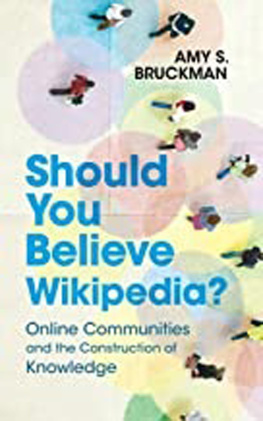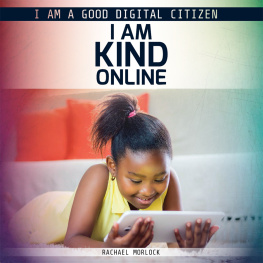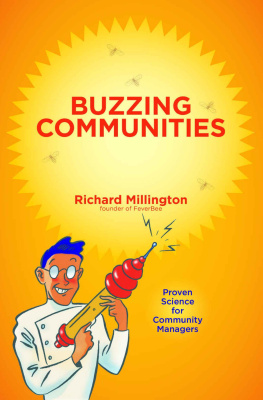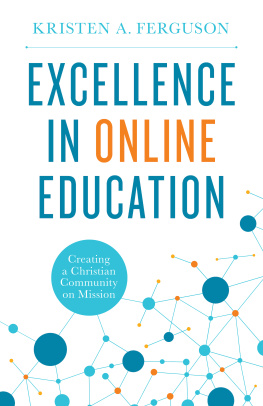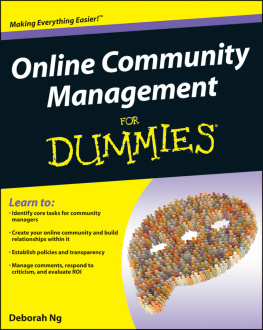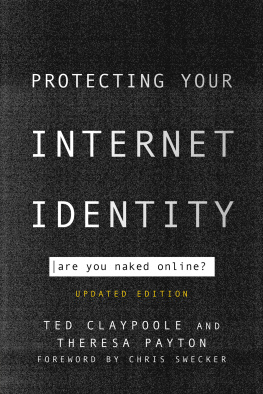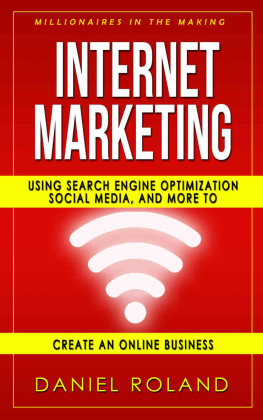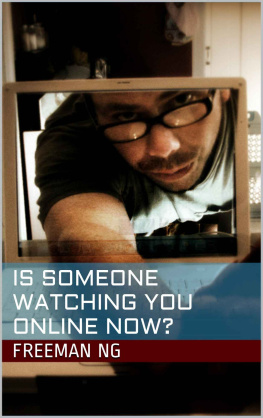Cambridge
UNIVERSITY PRESS
University Printing House, Cambridge CB2 8BS, United Kingdom
One Liberty Plaza, 20th Floor, New York, NY 10006, USA
477 Williamstown Road, Port Melbourne, VIC 3207, Australia
314-321, 3rd Floor, Plot 3, Splendor Forum, Jasola District Centre,
New Delhi110025, India
103 Penang Road, #05-06/07, Visioncrest Commercial, Singapore 238467 Cambridge University Press is part of the University of Cambridge.
It furthers the Universitys mission by disseminating knowledge in the pursuit of education, learning, and research at the highest international levels of excellence.
www.cambridge.org
Information on this title: www.cambridge.org/9781108490320 doi : 10.1017/9781108780704
Amy S. Bruckman 2022
This publication is in copyright. Subject to statutory exception and to the provisions of relevant collective licensing agreements, no reproduction of any part may take place without the written permission of Cambridge University Press.
First published 2022
Printed in the United Kingdom by TJ Books Limited, Padstow Cornwall A catalogue record for this publication is available from the British Library.
Library of Congress Cataloging-in-Publication Data names: Bruckman, Amy, author.
title: Should you believe Wikipedia? : online communities and the construction of knowledge / Amy S. Bruckman, Georgia Institute of Technology.
description: Cambridge, United Kingdom ; New York, NY : Cambridge University Press, 2022. | Includes bibliographical references and index.
identifiers: lccn 2021031711 (print) | lccn 2021031712 (ebook) | isbn 9781108490320 (hardback) | isbn 9781108748407 (paperback) | isbn 9781108780704 (epub)
subjects: lcsh : Online social networks. | Internet-Social aspects. | Internet-Psychological aspects. | Internet users-Psychology. | Knowledge, Theory of
classification: lcc HM742 .B78 2022 (print) | lcc HM742 (ebook) | ddc 302.23/1-dc23 LC record available at https://lccn.loc.gov/2021031711 LC ebook record available at https://lccn.loc.gov/2021031712
isbn 978-1-108-49032-0 Hardback isbn 978-1-108-74840-7 Paperback
Cambridge University Press has no responsibility for the persistence or accuracy of URLs for external or third-party internet websites referred to in this publication and does not guarantee that any content on such websites is, or will remain, accurate or appropriate.
PREFACE
SHOULD YOU BELIEVE WIKIPEDIA?
As we interact online we are creating new kinds of knowledge and community. How are these communities formed? How do we know whether to trust them as sources of information? In other words, should we believe Wikipedia? This book explores what community is, what knowledge is, how the internet facilitates new kinds of community, and how knowledge is shaped through online collaboration and conversation. Along the way the author tackles issues such as how we represent ourselves online and how this shapes how we interact, why there is so much bad behavior online, and what we can do about it. And the most important question of all: What can we as internet users and designers do to help the internet to bring out the best in us all?
Amy S. Bruckman is Regents Professor and Senior Associate Chair in the School of Interactive Computing at the Georgia Institute of Technology, where she studies online communities. Bruckman received her PhD from the MIT Media Lab in 1997. She is a Fellow of the ACM and a member of the SIGCHI Academy. She founded her first online community in 1993, and has been teaching the class Design of Online Communities at Georgia Tech since 1998. She currently helps moderate a number of large online communities.
CONTENTS
Acknowledgments page xi
Introduction: Design and Social Behavior 1
1 Are Online Communities Really Communities? 8
What Is a Community? 9
Social Capital 12
Strong and Weak Ties 13
Persistent and Pervasive Community 16
Third Places 18
Online Third Places 21
Social Roles 24
Social Norms 27
Theoretical Summary 29
Practical Applications 31
2 What Can Online Collaboration Accomplish? 32
From the World Book to Wikipedia 33
Citizen Science 36 Motivation in Citizen Science 40
Peer Production and Intellectual Challenge: The Polymath Project 43
Understanding Online Collaboration as a Mode of Production 45
The Structure of Wikipedia 49
Open-Source Software: The Cathedral and the Bazaar 52
Innovation and Leadership in Online Collaboration 57
When Good Will Fails: Boaty McBoatface 61
Theoretical Summary 62
Practical Implications 63
3 Should You Believe Wikipedia? 64
How Do You Know? 64 Metaphysics: Internal Realism 68
Epistemology 70
Social Construction of Knowledge 73
Peer Review 76
The Reality of Review 77
Should You Believe Wikipedia? 79
Theoretical Summary 86
Practical Implications 87
4 How Does the Internet Change How We Think? 91
Becoming Part of a KnowledgeBuilding Community 93
Knowledge Building as a Socio-technical System 97
Across Distance 98
Echo Chambers 99
Threats to Knowledge Building 103
Is the Internet Encouraging Belief in Conspiracies? 107
Enter the Trolls 110
Quality of the Product 114
Theoretical Summary 115
Practical Implications 116
5 How Do People Express Identity Online, and Why Is This Important for Online Interaction? 118
The Presentation of Self in Everyday Life 118
Expressions Given and Expressions Given Off 122
Fronts and Roles 124
Identity Online: Usernames 125
Elements of Online Identity 128
Gender Online 129
Identity Workshop 135
Identity Deception 137
Age and Race 139
Identity and Communities Focused on a Specific Demographic 140
Subgroup Conversation in a Public Space:
Black Twitter 143 Privacy 144
Social Networks and Privacy 147
From Anonymous to Identified 149
Why We Need Pseudonymity 152
Anonymity and Accountability 154
The Future of Online Identity 156
Theoretical Summary 158
Practical Implications 159
6 What Is Bad Online Behavior, and What Can We Do About It? 160
What Regulates Behavior? 163
Laws 163
How Could Laws About Speech be Improved? 167
Rules and Social Norms 171
Online Groups, Civility, and Radicalization 173
Technology 176
Enacting Moderation: Software, Volunteers, and Staff 180
An Ounce of Prevention 182
Online Public Shaming 184 Computer-Generated Content 185
Exit, Voice, and Loyalty 188
Value Judgments 190
Theoretical Summary 191
Practical Implications 192
7 How Do Business Models Shape Online Communities? 194
Markets as a Regulator 195
The Cost of Customer Service 198
The Evolution of Business Models for Online Communities 201
Business Models as Regulation 202
What New Business Models Are Possible? 207
Theoretical Summary 211
Practical Implications 212
8 How Can We Help the Internet to Bring Out the Best in Us All? 213
Community 214
Collaboration 217 Truth and Knowledge 217
Identity 221
Living with and Managing Bad Behavior 223
The Need for an Educated Citizenry 225
Aspiration and Design 227
References 231
ACKNOWLEDGMENTS
I had so much fun writing this bookIm actually sad that its done. First and foremost, Id like to thank my husband Pete Weimann and my sons Noah and Evan Weimann, who listened to me ramble about the book over dinner and on long hikes for years. Evan, thanks for figuring out where to stick the privacy content that needed a place, and Im sorry there are two anecdotes about your brother and none about you.

